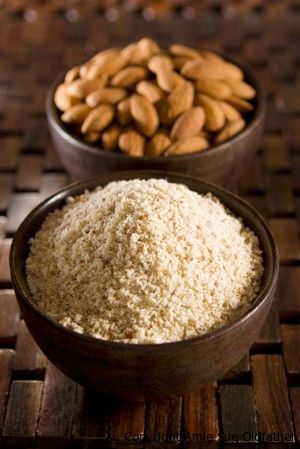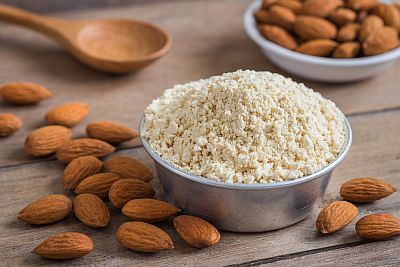Welcome to the nutty world of almond flour, where healthy eating meets deliciousness without the gluten fuss. If you’ve ever wondered what the buzz is all about, you’re in for a treat – or should we say, a “nuttylicious” adventure?
The Almond Flour Craze
Almond flour is like the health-conscious cousin of traditional wheat flour, and it’s taking the culinary world by storm. If you haven’t heard about it yet, don’t worry; you’re fashionably late to the party.
Why All the Fuss?
Today, we’re diving headfirst into the world of almond flour. We’ll uncover its nutritional superpowers, explore how it can make your baked goods guilt-free, and even toss in some friendly comparisons with its wheaty counterpart.
So, put on your apron and sharpen those taste buds because we’re about to discover why almond flour is the nutty choice for a healthier you.
Also Read: Paleo vs. Keto
What Is Almond Flour?

So, you’ve heard the buzz about almond flour, but what’s the deal with it?
Almond Flour Recipe Unleashed
Well, it all starts with some good ol’ almonds. First, they take those almonds and give them a hot tub treatment in boiling water to peel off their skins. Then, it’s a whirlwind romance in the grinder until they become this fine, delicate flour.
But Wait, Almond Meal Wants In!
Now, you might have heard of almond meal, and you’re probably thinking, “What’s the big difference?” Let’s clear that up. Almond flour and almond meal are like cousins, but not the same. Almond meal keeps its skin, which makes it coarser and more rustic.
Texture Matters, Folks
Why does this matter? Well, it’s all about texture, my friends. When you’re whipping up those recipes, texture is like the secret handshake that can make or break your dish. So, know your flour, and you’ll be the master chef of texture-tastic creations.
Almond Flour’s Nutritional Profile
Alright, let’s dive into the treasure chest of almond flour’s nutrients without getting lost in a sea of complex words.
Unboxing Almond Flour’s Nutrients
When you pop open that bag of almond flour, you’re not just unleashing flour power; you’re unveiling a nutrient goldmine. In just one ounce (that’s around 28 grams), you get:
Calories: Fuel for the Body
First up, we have calories, the little energy packets that keep you going. Almond flour serves up 163 calories in that tiny package.
Fat: The Good Kind
Now, we’re talking healthy fats. Almond flour dishes out 14.2 grams of fat per ounce, with most of it being the good ol’ monounsaturated kind that your heart loves.
Protein: Building Blocks for Muscles
For those muscles that are working hard or just chillin’, almond flour brings in 6.1 grams of protein to the party.
Carbs: Keepin’ It Low
Carbs? Sure, they’re here, but not in a sugar rush way. Almond flour presents 5.6 grams of carbs, and it’s the low-key kind you want.
Dietary Fiber: Gut’s Best Friend
Hey there, fiber! Almond flour doesn’t forget about you, packing 3 grams of dietary fiber, which keeps your gut happy.
Vitamin E: The Antioxidant Hero
Now, for the superstar – vitamin E. Almond flour rocks it with 35% of your daily recommended intake. This vitamin is like your body’s superhero, fighting off those pesky free radicals that can age you faster than a time machine malfunction.
Manganese: A Silent Operator
Don’t underestimate manganese. Almond flour brings in 31% of your daily dose of this unsung hero, which plays a key role in various bodily processes.
Magnesium: The Mighty Relaxer
Magnesium? Check! It’s at 19% of your recommended intake. This mineral is like your body’s personal masseuse, helping you chill out, control blood sugar, and even lower blood pressure.
Copper: Not Just for Pennies
Copper? Yep, almond flour’s got 16% of your copper fix. It’s not just for pennies; it plays a role in various body functions.
Phosphorus: Bone Builder
Last but not least, we’ve got phosphorus at 13% of your daily needs. It’s like the builder working behind the scenes to keep your bones strong.
The Grand Nutritional Symphony
So, what’s the big deal about these nutrients? Well, think of them as the orchestra in your body’s grand symphony. Vitamin E fights aging villains, magnesium keeps things calm, and the rest play their own groovy tunes to keep your body rocking in tip-top shape.
Also Read: Barbell Squats
Almond Flour and Blood Sugar
Alright, folks, let’s talk about a topic that’s sweeter than a cherry on a sundae – almond flour and blood sugar.
The Sugar Rollercoaster Ride
You know that feeling after gobbling down a plate of pancakes smothered in syrup? You’re up in the sugar clouds, and then bam! You crash and burn. Well, almond flour doesn’t want to take you on that wild ride.
The Glycemic Index (GI) – Almond Flour’s Bestie
First off, let’s meet the Glycemic Index, or GI, for short. It’s like the DJ at the sugar party. High-GI foods make the sugar rush and crash happen faster than you can say “pancake coma.” Almond flour, though, is a low-GI rock star.
Slow and Steady Wins the Race
Almond flour is like the tortoise in the blood sugar race – slow and steady. It releases sugar into your bloodstream at a leisurely pace, giving you a smooth ride instead of a rollercoaster of sugar highs and lows.
The Sweet News for Diabetes and Insulin Resistance
Now, here’s the juicy part. If you’re in Team Diabetes or Team Insulin Resistance, almond flour might just become your MVP. It’s been known to befriend insulin and help keep your blood sugar levels in check.
Studies have hinted that almond flour can be the sidekick you’ve been waiting for. It might not wear a cape, but its low-GI magic could help control blood sugar, whether you’re in the diabetes league or just a sugar enthusiast.
So, when it comes to blood sugar, almond flour is the cool cucumber in a world of sugar-coated chaos. Say goodbye to sugar rollercoasters and hello to smooth almond flour roads.
Almond Flour and Gluten-Free Baking
Alright, folks, let’s dive into the world of gluten-free baking with our trusty sidekick, almond flour.
The Gluten Dilemma
Picture this: you’re at a party, and gluten is the star of the show, hiding in everything from bread to pasta. But for some folks with celiac disease or wheat intolerance, gluten is the villain in this story. It causes all sorts of havoc like tummy troubles, bloating, and fatigue.
Almond Flour to the Rescue
Now, enter almond flour, our gluten-free hero. It’s like the knight in shining armor for those who can’t tolerate wheat. Almond flour steps in, saves the day, and says, “Fear not, gluten-intolerant friends, I’m here!”
A Contamination Caution
But, hold your almond horses! While almond flour is naturally gluten-free, some sneaky products might be contaminated with gluten during their adventures in processing. So, make sure to check the packaging and look for that glorious “gluten-free” label.
With almond flour on your side, you can enjoy all the gluten-free baking your heart desires. Say goodbye to gluten troubles and hello to a world of delicious, wheat-free possibilities.
Almond Flour and Heart Health
Let’s talk about something as vital as your daily dose of drama – heart health. It’s not just a local affair; it’s a global blockbuster, with heart disease leading the charts.
The Blockbuster – Heart Disease
Heart disease is like that unexpected plot twist in a movie you never saw coming. It’s the big bad wolf of health concerns worldwide. But wait, there’s hope on the horizon!
Almonds: The Cholesterol Crusaders
Imagine almonds as tiny superheroes swooping in to save the day. Studies suggest that folks munching on more almonds experience lower levels of “bad” LDL cholesterol. It’s like they’re putting a shield around your heart.
Magnesium: The Undercover Agent
But there’s more to this heart-healthy story. Magnesium, the undercover agent in almonds, plays a role in regulating blood pressure. It’s like the silent hero who keeps things running smoothly behind the scenes.
So, folks, when it comes to your heart’s wellbeing, consider almond flour your trusty sidekick. It’s your tasty weapon against the heart disease villain!
Also Read: How Long Does It Take to Get in Shape?
How to Use Almond Flour in Cooking and Baking
Alright, you’ve got this amazing ingredient called almond flour, but now what? Fear not, fellow culinary adventurer, we’re diving into the delicious details of using almond flour in your kitchen.
The Almond Flour Charm
Almond flour is like the secret sauce of healthy cooking. You can sneak it into various recipes to amp up the nutrition factor.
Substitution Sensation
Ever wanted to play flour fairy and swap regular wheat flour with almond flour? Well, you can! In most recipes, you can do a simple one-to-one substitution. But wait, there’s a twist!
Texture Tango
Here’s the quirky part: almond flour doesn’t tango with gluten. So, be prepared for your baked goodies to be a bit denser and flatter. It’s like replacing a ballet dancer with a hip-hop artist in your dance routine – equally awesome but different moves.
Calorie Chronicles
Oh, and before you start baking up a storm, remember that almond flour is a bit more calorie-packed compared to its wheaty cousin. So, keep an eye on those portions if you’re counting calories.
Now that you’re armed with almond flour wisdom, go ahead, work your culinary magic, and create some delectable, healthier dishes!
Almond Flour vs. Other Alternatives
Alright, let’s get ready for the ultimate flour showdown! In one corner, we have our champion, almond flour. In the other, the heavyweight contenders, wheat and coconut flours. Ding, ding, ding!
Nutritional Royal Rumble
Almond flour struts into the ring, showing off its low-carb, nutrient-packed persona. It’s like the superhero of flours, with vitamin E, magnesium, and fiber in its corner.
Calorie Smackdown
But hold your spatulas! Almond flour packs a few more calories than wheat flour. It’s like a friendly calorie wrestling match – almond flour gives you more energy but plays it cool.
Gluten-Free Grudge Match
Almond flour’s secret weapon? It’s gluten-free! People with gluten issues can finally enjoy baked goods without the gluten-gremlins causing trouble.
Coconut Flour: The Dark Horse
Enter coconut flour, the dark horse of this competition. It’s got fewer calories but less nutritional firepower than almond flour. However, it’s a bit of a moisture magnet, so be prepared for some recipe adjustments.
Phytic Acid Plot Twist
Wait, what’s that? Almond flour dodges the phytic acid bullet, unlike wheat flour, which can play hide-and-seek with your nutrients. Almond flour keeps things straightforward.
In The Flour Ring, There Are No Losers
In this floury face-off, there are no losers, only tasty choices. Almond flour, wheat flour, or coconut flour – pick your champ based on your dietary goals and the dish you’re whipping up. It’s your kitchen, your rules!
In Crux
Now, as we dust the flour off our aprons and wrap up this almond-flour adventure, let’s summarize our floury findings in a way even your grandma would appreciate.
Almond Flour Bonanza
Almond flour isn’t just a flour; it’s a nutritional bonanza. With vitamin E, magnesium, and more goodies than your grandma’s cookie jar, it’s the flour that gives back.
A Flour for Every Diet
Whether you’re gluten-averse, a diabetes warrior, or just someone looking for a healthier option, almond flour’s got your back. It’s versatile, like a flour that knows how to dance to every diet’s tune.
Bake Your Dreams
So, dear readers, as you dive into the world of almond flour, remember, it’s not just about the flour; it’s about the delicious possibilities it brings to your kitchen. From cookies to cakes to savory surprises, almond flour can do it all.
Flour-ishing Adventures Await
Your flour journey has only just begun. So go on, add almond flour to your grocery list, and start creating flour-ishing recipes that’ll have your taste buds cheering. It’s time to bake your dreams and sprinkle some almond magic. Happy baking, flour warriors!
Thank you for joining us on this fitness journey! We hope you found our blog insightful and inspiring. Our aim is to provide you with valuable information, expert advice, and motivational content to support you in your wellness endeavors.
Related Post :-
- 1-The Secret to Digestive Wellness: Almond Snacking
- The Almond Benefits: 10 Reasons to Include Them
- The Art of Soaking Almonds: How It Impacts Your Wellness
- Power of Consistence
- Nutritional Gems: A Guide to 10 Healthy Nuts
FAQs about Almond Flour Advantage
How does almond flour stack up nutritionally?
Almond flour is a nutritional powerhouse, boasting vitamin E, magnesium, and other essential nutrients that support overall health.
Can almond flour help regulate blood sugar levels?
Indeed! Almond flour's low glycemic index and magnesium content make it a great choice for maintaining stable blood sugar levels, whether you have diabetes or not.
Is almond flour suitable for gluten-free baking?
Absolutely! Almond flour is naturally gluten-free, making it an ideal alternative for those with celiac disease or wheat intolerance.
What's the connection between almond flour and heart health?
Several studies suggest that almonds, and by extension almond flour, may help lower LDL cholesterol and contribute to better heart health.
How can I incorporate almond flour into my cooking and baking?
You can easily substitute almond flour for wheat flour in most recipes at a 1:1 ratio. Just be prepared for a different texture and slightly higher calorie content.
What sets almond flour apart from other alternatives like wheat and coconut flours?
Almond flour wins the nutritional race, with fewer carbs, more healthy fats, and a treasure trove of vitamins and minerals. Plus, it's gluten-free!
Is almond flour high in phytic acid like wheat flour?
Nope! Almond flour is the phytic acid champion, as it loses its skin during the blanching process, leaving your nutrient absorption unaffected.
Can almond flour really elevate my baking game?
Absolutely! It's time to bid farewell to your old baking habits and embark on an almond-flour adventure that'll take your creations to new heights.
What's the bottom line on almond flour?
In a nutshell, almond flour is your secret weapon in the kitchen, offering a healthier, gluten-free, and nutrient-packed alternative to traditional flours. It's time to let your culinary creativity soar with the power of almond flour!

Meet Pradeep Singh, your go-to guide for all things fitness, health, and motivation. With over 7 years in the field, Pradeep brings a blend of expertise and real-world experience to his writing. From workout tips to healthy living insights, he simplifies complex topics, making fitness accessible for everyone. His authentic approach and genuine passion aim to inspire and support your wellness journey. Get ready to embark on a path to a healthier lifestyle with Pradeep as your trusted companion and motivator.






















